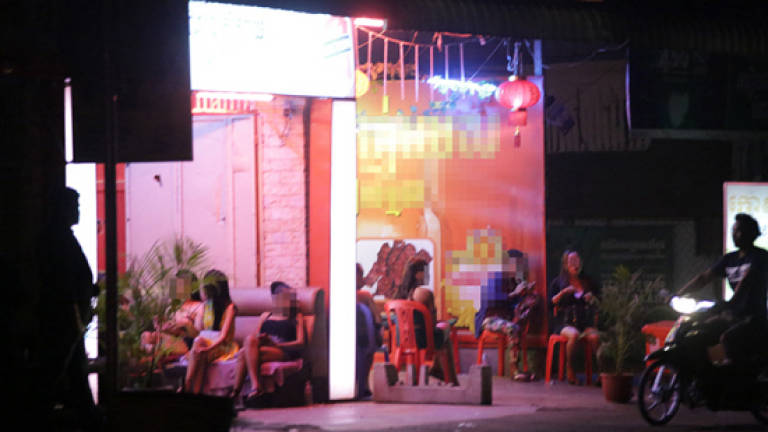Pregnancy tests and forced abortions reveal the darker side of KTV


CAMBODIA'S popular KTVs, or karaoke clubs, are in almost every town in the kingdom. They are known as places frequented mainly by men, who go there to drink, sing and be entertained by the attractive hostesses. But there is a dark side to these neon-lit clubs.
Life is a struggle for the mostly poor workers trying to make enough money to support themselves and their families, but considered to be prostitutes by wider society.
The women's jobs depend on enticing men into the clubs. As such, pregnancy is not an option and many say they have been forced or chosen to have abortions to keep their incomes.
One 25-year-old from Takeo province, who gave her name as only Sopheak out of fear of reprisals or her family discovering the work she had been doing, spoke to Khmer Times about the hardships she and others faced working in KTVs.
She said many clients at KTV clubs regularly abused the hostesses, groping them and treating them as if they worked in a brothel. Others carried guns, which they used to threaten women into having sex with them.
"Some men ask a KTV girl to have sex with them, then refuse to give her money afterwards and leave her to pay for the guesthouse room. Others steal the girls' phones," she said.
"I have experienced enough of that in my life. I don't want to think about it any more. I want to keep it in the far back of my mind."
Sopheak worked as a KTV girl for about three years in Phnom Penh until she decided to return to her hometown to live with her husband.
"We're lucky to have one son. During my time as a KTV girl, I had three abortions because I needed to keep my job. If I got pregnant I would have lost my job. When I got pregnant with my husband, we decided to lose the job and keep our son."
Speaking quietly, she explained that many KTV hostesses were forced to have abortions, because their bosses didn't want pregnant women in the clubs and clients were only interested in pretty girls.
"For the women without husbands, it was fine. But for those of us with husbands and who wanted to have children and a family, we had to stop working," she said.
"Our lives were always kept secret – I never told my parents what I did. I had to lie to my friends. I never let anybody know that I worked at a KTV because Cambodian people look down on KTV girls and think we are the same as those working in brothels," she added.
Sopheak said she saw many things during her time as a KTV girl, including the fact that her boss had no respect for the law.
She said many women were not paid overtime for the long hours they had to work, while they did not get any healthcare when they fell ill.
"We wanted to be treated under the same laws as garment workers. For garment workers, factory owners have to respect the law," she said.
In a BBQ restaurant in Phnom Penh, a 20-year-old woman who asked to be known as Thyda told Khmer Times how she became a KTV hostess.
She left her home in Pursat province and moved to Phnom Penh, at first becoming a garment worker after her family members found jobs in the construction sector in Thailand.
Thyda worked in a garment factory for about five months and struggled to survive, but made friends with a woman who was a KTV hostess and decided to give it a try.
She worked for a KTV club in Phnom Penh for more than one year – a period in her life she is now trying to forget.
Thyda said she would frequently get into trouble at night when she finished work and walked back to her rented room, sometimes coming across gangs who tried to rob her, other times being forced by clients to go and have sex with them.
"I had to drink every day to keep my clients happy, because my duty was to make my clients happy, even though on some days I was sick. I still had to smile and drink," she said.
"I was always drunk and I sometimes woke up still drunk, then I'd go to work and have to continue drinking," she added.
Thyda worked from 2pm until 2am or sometimes 4am, depending on the clients, and had one day off a week.
She said in a normal working day she had to drink from six to 12 cans of beer and was paid about 15,000 riel (RM14.80), but she spent the money buying make-up so she'd look attractive to clients.
"I worked in the KTV club, but I did not get a salary from the owner for working there," she said. "If I worked as full-time staff in the KTV, the owner would cut my salary from between US$5 and US$10 (RM19.80 and RM39.50) per day if I took a day off.
"I could come to work on any day, depending on me, because I only worked for tips from customers. On some days I did not get any money," she added.
She said many of the women working at the KTV parlour had abortions when they became pregnant.
"My boss always did urine tests one or two times a month. If he found out a KTV hostess was pregnant, he would order them to abort the baby. Most of the girls didn't want to have an abortion, but they did so to save their jobs," she said.
"I never told my parents that I was working at a KTV because I know that all people look down on us. They think we are working in the sex industry, but in fact the job is a normal job like most others.
"Going out to have sex with a client is an individual choice and not all the KTV girls do that because some have husbands.
"I had an abortion one time because I already had a baby with my boyfriend."
With her white skin and heavy make-up, Thyda added: "I worked the job to save money.
"In future, I hope to go back to my province, start a salon business, get married and start a new life.
"I don't know when my dream will come true."
Article 14 on the Law on Abortion says that any person who compels a woman to have an abortion or causes her an abortion shall be punished from one to five years in prison. If someone forces a pregnant woman to have an abortion or causes her an abortion which results in a chronic disease, disability or death, they shall be subject to a punishment from five to 10 years in prison.
A 30-year-old KTV parlour manager, who identified herself Chantrea, said she makes her staff take urine tests for pregnancy every one or two months.
She said a lot of her hostesses went for abortions after discovering they were pregnant following urine tests.
"If they did not abort my KTV owner would fire them," she said.
"If the clients know our girls are pregnant, they will not come to our KTV, so my boss has to take care of that."
She added that when KTV women have an abortion, the owner allows them to stay home until they recover and they can then come back to work.
"Sometimes I know my KTV girls have a husband. If they get pregnant, I keep that information secret for four months and then they quit their jobs. So I have to lie to my boss too.
"For some KTV girls, when they get pregnant they know they have to have an abortion and they do not need me or my boss to come and tell them, but some girls don't have the money, so they keep quiet until the second or third month," she added.
She said she once took a KTV girl to get an abortion at a private clinic. The price was about US$30, but she had to keep it secret because it was illegal.
Ms Chantrea said she worked at a KTV club because she could earn a lot of money. On some days she takes home US$80 to US$100, money she uses to support her son and her parents. "I don't want my son to know about my work when he grows up because a lot of people discriminate against that job," she said.
In 2002, Prime Minister Hun Sen ordered the abrupt closure of all karaoke bars to protect people from criminal activities associated with the venues. After the order, authorities across the country cracked down on Cambodia's nightlife.
In Phnom Penh alone the government closed 1,053 night-time establishments in seven districts, leaving an estimated 4,228 employees facing potential unemployment.
A 2012 Unicef report estimated there were about 35,000 "entertainment workers" in Cambodia's KTVs, the majority of them in Phnom Penh.
Karaoke culture came from Japan in the 1970s and has since spread to the rest of Asia and other parts of the world.
The word karaoke is a combination of two words: kara and okesutora. Kara means empty and okesutora means orchestra.
A group of researchers reported that KTV hostesses at clubs in Phnom Penh hailed from across the country, with 20% from Kandal, 12% from Kampong Cham and Kampot, 10% from Prey Veng, Kampong Thom and Phnom Penh, 8% from Takeo, 6% from Svay Rieng, 4% from Pursat and Kampong Chhnang and 2% from Kampong Speu and Battambang.
Nut Sophal, a representative of the Cambodia Food and Services Workers' Federation, said the women who work at KTV clubs were discriminated against by society, so most did not tell their families about their work.
"They work hard, but their salaries are from US$60 to US$110 per month. When they get sick and take a day off, their bosses cut their salaries by US$10 to US$20 per day," she said.
She said the Ministry of Labour should make it that KTV women have proper contracts with the owners of venues, while their working hours should be eight hours per day, as the law stipulates.
She added the women should have a day off on the weekend.
"They should also have healthcare services like other workers," she said.
"They face many problems with the KTV owners – if they get pregnant their bosses fire them, so many of the women are forced to have abortions to keep their jobs."
In August, Mr Hun Sen told a gathering of thousands of garment industry employees that they would receive free healthcare and free access to public transport in Phnom Penh, plus a minimum wage increase to US$170 per month.
He has been hosting similar events every Sunday and visits workers every Wednesday to hear their concerns.
Venerable San Sochea, a senior monk who lives in a pagoda in Phnom Penh, said women should think hard when it comes to abortion.
"You can ask the child in your stomach, does he or she agree with you killing them? They did not see the sun rise yet, but face being aborted," he said.
With her crying baby in her lap, former KTV hostess Sopheak said: "I want to deliver my message to young women – you should find other jobs. You will put a lot of pressure on yourself working in a KTV club, believe me."
Labour Ministry spokesman Heng Sour could not be reached for comment. — Khmer Times